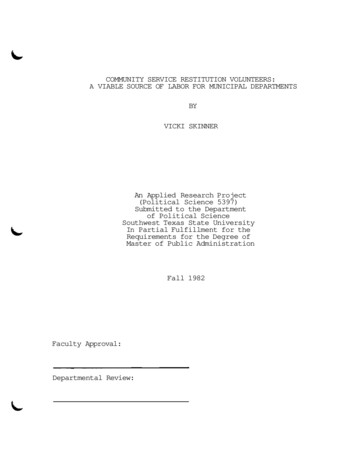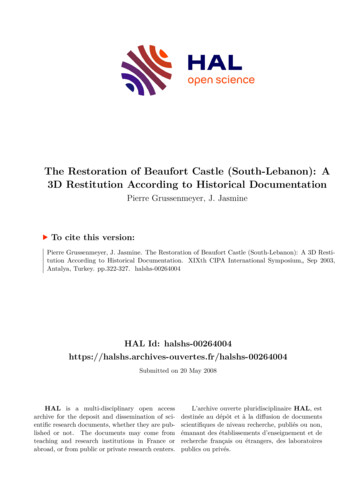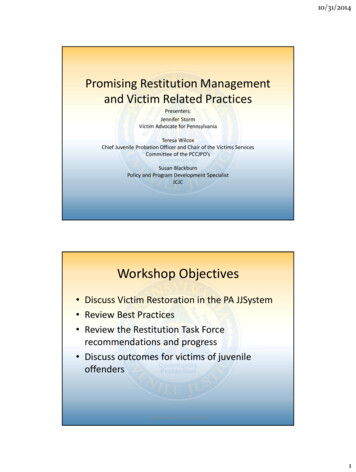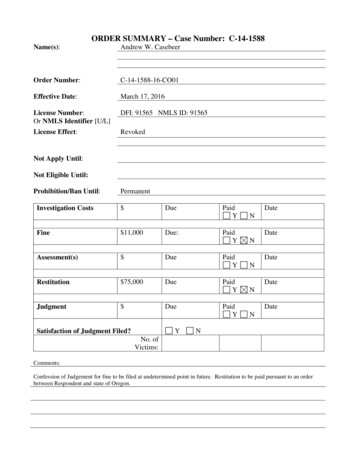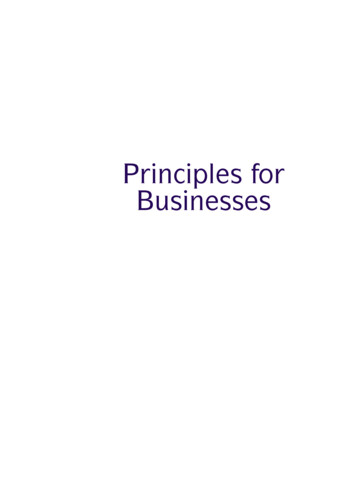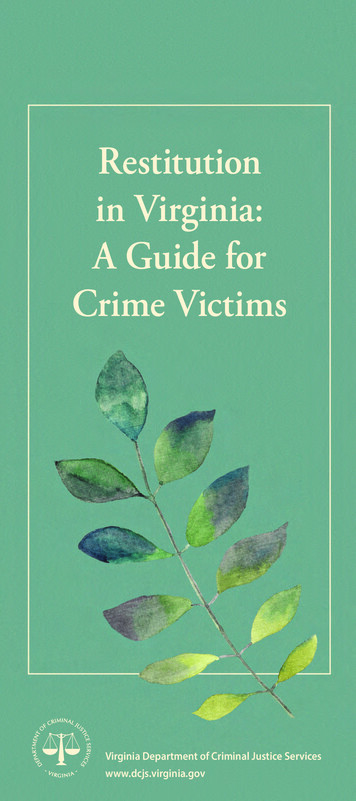
Transcription
Restitutionin Virginia:A Guide forCrime VictimsVirginia Department of Criminal Justice Serviceswww.dcjs.virginia.gov
IntroductionThe goal of this brochure is to answer questions thatvictims of crime often have about restitution and toprovide information and resources to assist with therestitution process. Restitution is one way of holdingcriminals accountable for their crimes. The VirginiaDepartment of Criminal Justice Services worked withvictim advocates, prosecutors, court staff, and othersto develop this brochure for crime victims who havesuffered financial loss due to crime.If you have questions about any of the topics coveredhere or other questions about restitution, please contactyour local Victim/Witness Assistance Program or theCommonwealth’s Attorney’s Office in your locality.
What is restitution?The purpose of restitution is to compensate or repay acrime victim for monetary loss due to a crime. Restitutionis court-ordered by a judge. It is usually limited to payments for damages or losses directly caused by a crime.Whenever a defendant is ordered to pay restitution, anymoney collected by the court is used first to pay restitution before being used to pay fines, costs, or penalties.How do I request restitution?The judge will need information about your losses in orderto determine the amount of court-ordered restitution. Itis important to keep a record of all expenses related to thecrime. Make sure you give this information to your localVictim/Witness Assistance Program or Commonwealth’sAttorney’s Office. It is your responsibility to provide copiesof the bills and other documents showing the extent ofyour injuries, out-of-pocket losses, and any other damagesyou want the court to consider in ordering restitution.The information must be received as soon as possible, andprior to the trial date.When do I request restitution?Give your restitution information to your local Victim/Witness Assistance Program or Commonwealth’sAttorney’s Office, as soon as possible. Restitution mightnot be ordered if you do not provide the informationprior to the trial date. It is important to stay in frequentcontact with your Victim/Witness Assistance Program inorder to follow all case developments and deadlines. Todetermine the date on which information is needed inyour case, call the Victim/Witness Assistance Program orCommonwealth’s Attorney’s Office.If restitution information is not provided in time, youmay have to pursue your restitution request through acivil lawsuit. Regardless of whether or not restitutionis court-ordered, you may also consult a privateattorney regarding other legal remedies that maybe available. Please ask the Victim/WitnessAssistance Program staff as early as possiblepage 1
about which expenses can be part of a restitution request. This may help you to decide aboutpursuing a civil lawsuit or insurance settlement.At the time of sentencing, the court is required toenter an Order of Restitution (DC-317) which includes: Amount of restitution to be repaid by the defendant Date by which all restitution is to be paid Terms and conditions of such repaymentYou may request a free copy of the restitution order fromthe court clerk’s office for your records.Which expenses can be included?Ultimately, the judge will determine what expenses will beconsidered and the amount of restitution to be awarded.The court may consider ordering restitution for medical/dental costs, reimbursement for an insurance deductible,funeral costs, lost or damaged property, stolen goods, andother out-of-pocket expenses resulting from the crime.What are some helpful tips for documentingand collecting restitution? Keep your address and phone number up-to-datewith the court clerk’s office where the defendant wassentenced. To efficiently update your record, the clerk’soffice will need the defendant’s name. Contact theclerk’s office or your local Victim/Witness AssistanceProgram for more information about how to updateyour address information. Keep copies of your restitution related records becauseyou may be called to testify if there are questionsabout restitution in your case. Keep a list of medical and other service providersyou have seen for any crime related losses or injuries,including their mailing addresses and other contactinformation. Keep all bills, cost estimates, insurance benefitsummaries, medical records, payment receipts and/or bank records in one central location, such as apage 2
binder or folder. The judge will often request thisinformation when determining restitution amounts. Make sure, before you leave the courthouse, that youknow who to contact if you do not receive restitutionpayment(s) as ordered by the judge.Are there other sources of compensation?In addition to court-ordered restitution, you may beeligible for compensation from other sources such as:the Virginia Victims Fund (VVF), mortgage insurance,medical insurance, hospital financial assistance, homeowner’s/renter’s insurance, liability insurance, disabilityinsurance (private or state), veteran’s benefits, social security benefits, or a funeral/burial policy.If the crime is related to a vehicle, you may qualify forbenefits under an automobile insurance policy and youcan request restitution for any auto insurance deductible.If the crime occurred during the course of employment,or arising out of employment, you may be eligible forworkers’ compensation benefits.Should I agree to direct payments from thedefendant?Once restitution is court-ordered, you should accept restitution only in the manner ordered by the court.How do I receive restitution payments, oncethey are ordered?It is important to remember that restitution may be paidto you in installments, as allowed by court-order.Court-ordered restitution must be paid by the defendantto the clerk of the court, by the due date specified in thecourt-order. However, you should not expect to receiveyour payment on the same date it is paid to the court.Once the clerk receives a payment, verificationand processing activities will likely take 21 daysor more to complete.page 3
To ensure timely payment, it is very importantto keep your address and phone numbercurrent with the clerk’s office of the court wherethe trial occurred. If your check is returned to theclerk, or remains uncashed for one year or more, theclerk will submit the funds to the Virginia Victims Fund.In this case, getting those funds redirected back to youwill take additional time.What if my address changes before I receive allrestitution payments?In order to receive restitution payments, you must keepyour address and phone number up-to-date with theclerk’s office where the final sentencing of the defendantoccurred. To efficiently find and update your record, theclerk’s office will need the defendant’s full name. Contactthe clerk’s office or your local Victim/Witness AssistanceProgram for more information about how to update youraddress information.Is my address confidential?Victim contact information is excluded from the copyof the Order of Restitution (DC-317) provided to thedefendant. However, other court records, available to thepublic, may include your contact information.As a victim of crime, you can take an additional step torequest that certain information be kept confidential, inaccordance with the law. Specifically, you can request thatcourts, police departments, sheriff’s offices, commonwealth’s attorneys, defense attorneys, and the Departmentof Corrections not disclose, except among themselves,your home address, phone number, or place of employment. To request confidentiality, you must file a Requestfor Confidentiality form (DC-301) and submit it to theclerk’s office. Please ask the Victim/Witness AssistanceProgram or Commonwealth’s Attorney’s Office staff if youhave questions or need assistance. The form can be locatedon the Supreme Court of Virginia website: e 4
What are the consequences if a defendant failsto pay restitution?If a defendant does not pay court-ordered restitution, his/her driver’s license could be suspended, the debt couldbe sent to collections, the defendant may be required togo before a judge to explain why restitution has not beenpaid and the defendant could face jail time.Should I file a claim with the Virginia VictimsFund (VVF) or request restitution through mycriminal court case?Defendants are often incarcerated and unable to pay theirrestitution, so you may want to consider filing a claimwith the Virginia Victims Fund (VVF), in addition torequesting restitution. If a claim is eligible under VVF,then VVF can pay service providers directly and can assistin keeping your related bills out of collections. The VVFcan seek restitution from the defendant for the amount itpays on your behalf. Discuss the best option for you withyour local Victim/Witness Assistance Program staff. Thefollowing is a list of expenses that could be considered bythe Virginia Victims Fund: Medical Expenses Funeral Expenses Lost Wages Prescriptions Crime-Scene Clean-Up Moving Temporary Housing Mileage To medical appointments To court-related appointments for child victims Loss of Support From an offender removed from the home indomestic violence or child sexual-assault cases Dependents of Homicide Victims Counseling For direct victims For children who witness domestic violence For the immediate family of a homicidevictimpage 5
Further information about the VVF,including benefits, deadlines, and eligibilityrequirements may be found online at:virginiavictimsfund.orgHow is restitution connected to the VirginiaVictims Fund (VVF)?If you completed an application with the Virginia VictimsFund (VVF; sometimes referred to as the CriminalInjuries Compensation Fund (CICF)), please note thatthe amount awarded, as of the sentencing date, canbe included in the Restitution Order. Please let theCommonwealth’s Attorney’s Office and/or Victim/WitnessAssistance Program staff know that you have filed a VVFclaim and the status of the claim prior to the trial date.When restitution is ordered to a victim that cannot belocated, any restitution collected becomes unclaimedand is forwarded to the Virginia Victims Fund (VVF).If you believe that restitution due to you may have goneunclaimed, you must contact the court clerk’s office thatwas collecting the restitution and provide your updatedaddress and the name of the defendant(s). The court willthen send an Unclaimed Restitution Repayment Form toVVF directing VVF to make payment to you.What if the defendant is in jail or prison?Restitution payments often will not begin until the defendant is released from jail or prison. Once the defendant isreleased, payments may be made as required by a courtordered payment plan.You may wish to review the defendant’s restitutionorder with the Victim/Witness Assistance Program orCommonwealth’s Attorney’s Office staff to find out aboutwhen to expect payments and who to contact in case ofproblems.What if the defendant is on probation?When a defendant is court-ordered to pay restitutionand is placed on supervised probation by the judge, thedefendant is required to pay restitution to the clerk’spage 6
office. If you have questions about restitution or if you donot receive payments in accordance with the RestitutionOrder, please let the Victim/Witness Assistance Programor Commonwealth’s Attorney’s Office staff know that youhave not received your restitution. Please note the duedate for the restitution, because the court cannot takeaction until after the court-ordered due date.Notespage 7
Helpful Resourcescourt location and contact lCommonwealth’s Attorney location andcontact arch.cgiVictim/Witness Assistance victim-assistance-directory.pdfFor information, assistance, and referrals, please call thesestatewide toll-free numbers.Virginia Victim Assist Helpline1-888-887-3418(Hours of operation: Monday – Friday, 8:30 am–4:30 pm)http://vanetwork.orgVirginia Information and Notification Everyday (VINE)1-800-467-4943www.vinelink.comVirginia Department of Corrections Victim ServicesProgram1-800-567-4292(Hours of operation: Monday – Friday, 8:15 am–5:00 pm)https://vadoc.virginia.gov/victimemail at: victimservices@vadoc.virginia.govVirginia Victims rginia Workers’ Compensation age 8
Additional InformationandAssistance in Your CaseTo receive further information and assistance regardingrestitution in your case, please contact your local Victim/Witness Assistance Program.The local contact information:The name, address, and telephone numberof the clerk’s office:The name, address, and telephone numberof the Commonwealth’s Attorney’s Office:
Virginia Department of Criminal Justice Serviceswww.dcjs.virginia.gov01/18
Victims Fund (VVF)? If you completed an application with the Virginia Victims Fund (VVF; sometimes referred to as the Criminal Injuries Compensation Fund (CICF)), please note that the amount awarded, as of the sentencing date, can be included in the Restitution Order. Please let the Commonwealth's Attorney's Office and/or Victim/Witness
